In a time of rising Islamophobia and anti-Arab hate, a beloved Oklahoma man is gunned down.
The Jabara family left Lebanon in 1983, fleeing that country’s brutal civil war, and settled in a quiet neighborhood in Tulsa, Oklahoma.
Things were good. Mounha Jabara and his wife, Haifa, set up a successful catering business, and saw to it that their three kids graduated high school and went to college. By all accounts, they were living the American dream.
But five years ago, that dream turned into a nightmare. The monster in that nightmare is named Stanley Vernon Majors, a 61-year-old ex-convict from California who repeatedly harassed and threatened the Jabaras, largely because they were Arab-American.
Two weeks ago, on the evening of Aug. 12, Majors allegedly shot and killed the family’s youngest child, 37-year-old Khalid Jabara.
“They escaped from the war, from the horrific situation in Lebanon and then they end up in tragedy like this in a country they adore,” Khalid’s cousin, Tania, told the Tulsa World.
Police have yet to establish a clear record of what happened the day of Khalid’s death. But from everything we know, it seems that Vernon Majors hated the Jabara family, and that he harbored baseless and destructive anti-Muslim beliefs ― ones that plenty of other Americans also subscribe to.
Majors’ hate did not and does not exist in a vacuum. It exists in a country where openly Islamophobic political speech is on the rise, and where Muslims ― or, as in the case of Khalid Jabara, people perceived to be Muslim ― are being targeted more and more for their faith, their dress and the color of their skin.
If Majors is a monster, he’s an American one.
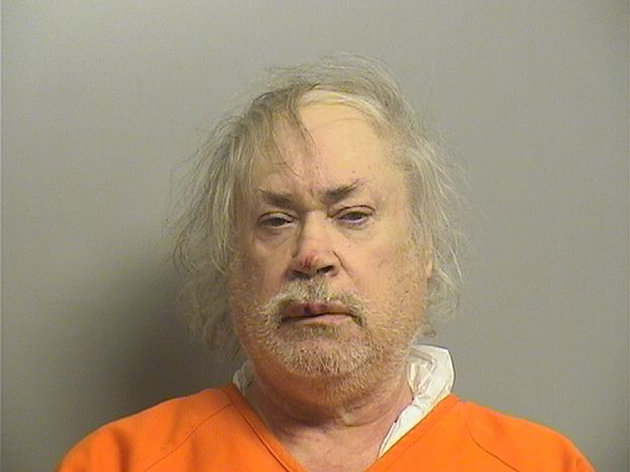
The Killing
Majors, a Los Angeles native, moved next door to the Jabaras in 2011. He soon developed what a police captain would later describe as an “unusual fixation” with the family.
He terrorized them, leaving menacing letters in crude handwriting on the Jabaras’ property. There were threatening voicemails and emails too. Most telling, perhaps, were the slurs he allegedly hurled at the family: “dirty Arabs,” “Aye-rabs” and “Mooslems.”
“Fuck you Arabs, Fuck you bastards,” he allegedly told the family once. “I want to kill you all.”
In September 2015, Majors hit Haifa Jabara with a car, nearly killing the 65-year-old woman. He confessed to the crime and was charged with assault and battery with a deadly weapon, among other offenses. He was jailed pending a trial ― but in May, he was released on a $60,000 bond. The trial is still pending.
“My family lived in fear of this man and his hatred for years.”Victoria Jabara
With Majors back in the house next door, there seemed to be no escape for the Jabara family.
“My family lived in fear of this man and his hatred for years,” Victoria Jabara, Khalid’s sister, wrote in a recent Facebook post. “Yet in May, not even one year after he ran over our mother and despite our repeated protests, he was released from jail with no conditions on his bond ― no ankle monitor, no drug/alcohol testing, nothing.”
On Friday, Aug. 12, Khalid Jabara ― who still lived with his parents in the house, attending to their health and helping out with the family’s catering business ― received a phone call. It was Majors’ husband, Stephen Schmauss, with whom Khalid had always been on friendly terms. Be careful, Schmauss said. Vernon has a gun. Khalid immediately called his mother, who was out. Don’t come home, he warned her.
When police arrived at Majors’ house, he didn’t answer the door, so they left. It was 6:40 p.m. At 6:48, Khalid walked onto the front porch. There, police say, he found Majors, pointing a large-caliber handgun at him.
Minutes later, a 911 operator received a frantic call from Mounha Jabara, Khalid’s father. The man next door had shot his son, he said.
“Please hurry!” a woman’s voice says on the call ― a neighbor who’d witnessed the shooting. “He’s bleeding, he’s bleeding so much!”
Khalid ― remembered at his funeral as a man who “brought a joy when there was darkness” ― was pronounced dead at the hospital. Meanwhile, police found Majors hiding outside a nearby library and arrested him.
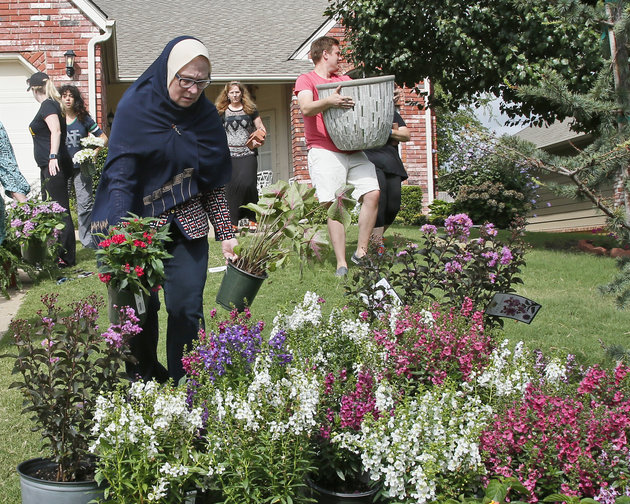
The Racialization of Islam
The Jabaras are Orthodox Christian, not Muslim.
But many Americans today seem to share one or more of a set of interlocking assumptions: 1) no white people are Muslims; 2) every black or brown person is potentially a Muslim, even if they say otherwise; 3) every Muslim is a threat to the U.S., and/or Judeo-Christian people, and/or white people.
None of these ideas have any merit. But they help explain why nearly 30 percent of Americans, including possibly Donald Trump, still think the country’s first black president is secretly a Muslim.
And it’s why people of the Sikh faith ― a religion distinct from Islam, not that it should matter ― are so often the targets of anti-Muslim violence and prejudice. “The only crime I committed was wearing a turban,” a Sikh man in Texas said after he was wrongfully arrested on a bus earlier this year. A man vandalized a Sikh temple in Washington because he thought it was a mosque connected to Islamic militants. Another man broke into a Sikh family’s home and threatened to kill the father with a knife for being a “terrorist.” Sikh men have also been assaulted in California and Chicago.
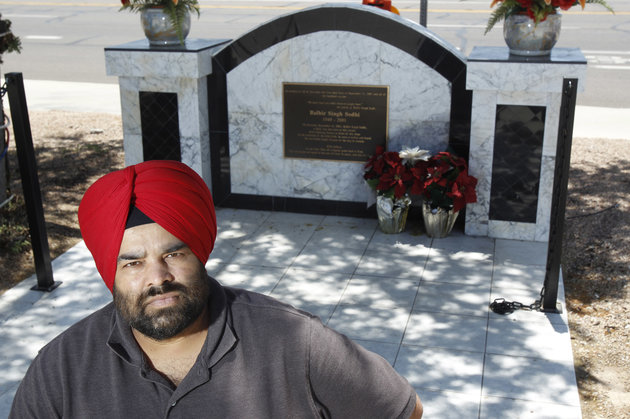
Compounding this problem is simply that most Americans don’t know their Muslim neighbors. A poll in 2014 found that 63 percent of Americans don’t know any Muslims personally.
“For the majority of Americans, their only exposure to Islam and Muslims is through the news media and the web,” Jordan Denari Duffner, a research fellow atGeorgetown University’s Bridge Initiative, a multi-year project studying Islamophobia, told The Huffington Post in an email. “Though I would argue that positive portrayals of Muslims are slightly more prevalent in the media than they used to be, the primary context in which Americans are exposed to Muslims is in news coverage of ISIS attacks or other incidents of violence.”
“Mr. Majors seemed to conflate being Arab with being Muslim — a mistake I’ve witnessed people make in my own community,” she continued. “But the answer isn’t simply to distinguish between Muslims and Arabs, or Muslims and other groups (like Sikhs) that are often perceived to be Muslim. That would leave Muslims still being targeted. What is needed is to humanize all of these groups of individuals, to demonstrate that no one deserves to be discriminated against because of an aspect of their identity.”
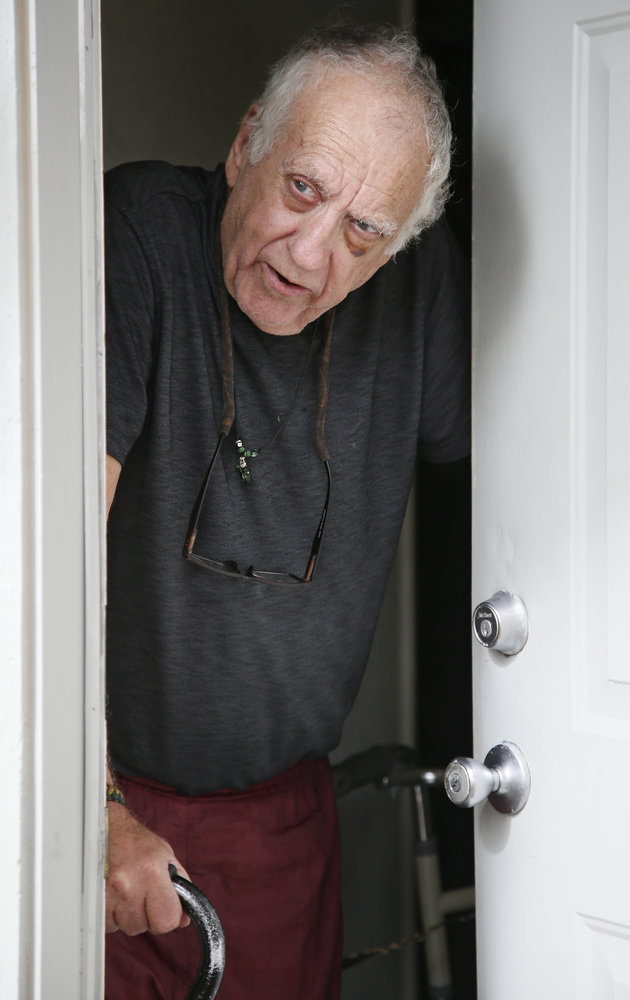
Pink-Washing
The “filthy Lebanese” who “throw gay people off rooftops.”
That’s how Majors reportedly described the Jabara family to police last year, after he hit Haifa Jabara with his car.
Rania Khalek at Electonric Infitada puts Majors’ comments into their political context:
After the Islamic State group, also known as ISIS, began releasing shocking propaganda videos in late 2014 showing the group throwing people it accused of being gay off a roof, the right-wing echo chamber that typically incites hate against gays went to work portraying the savage acts of ISIS as representative of the supposedly inherent intolerance in Islam and Middle Eastern culture.
This rhetorical strategy ― known as pinkwashing ― is also used to portray Western countries and Israel as inherently more tolerant and thus to justify or erase violence against allegedly uncivilized Muslims.
It’s true that there is very real and dangerous homophobia in Muslim-majority countries. But there are horrifying homophobic attitudes in just about every corner of the world. Islam is no more inherently anti-gay than, for example, Christianity. Both religions’ holy texts have passages that have been used to justify the persecution of queer people.
“The American LGBTQ community seems not to have figured out that we’ve been conscripted into the country’s Middle Eastern wars, thanks to the liberation narrative that’s clotted LGBTQ political narratives in the wake of marriage equality,” Raillan Brooks, who is gay and Muslim, wrote earlier this year in The Village Voice.
“It did get better — thanks to Uncle Sam — and now, it seems, we owe him,” continued Brooks, a former HuffPost editor. “So when he asks for support for drone strikes in Syria, or a blithe military alliance with Israel (one of whose expansion stratagems is to pitch Tel Aviv as a gay mecca reclaimed from the gay-murdering Palestinians), he’s also sure to remind us of the ‘human rights violations’ in whatever Muslim state he wants to bomb next. It’s called ‘pink-washing,’ and it gets liberals to consent to intervention after intervention in the names of queer people.”
When Majors reportedly called the Jabaras “filthy Lebanese” who “throw gay people off rooftops,” it seems he was operating on two erroneous assumptions at once ― that all Arabs are Muslims, and that all Muslims hate people like him.
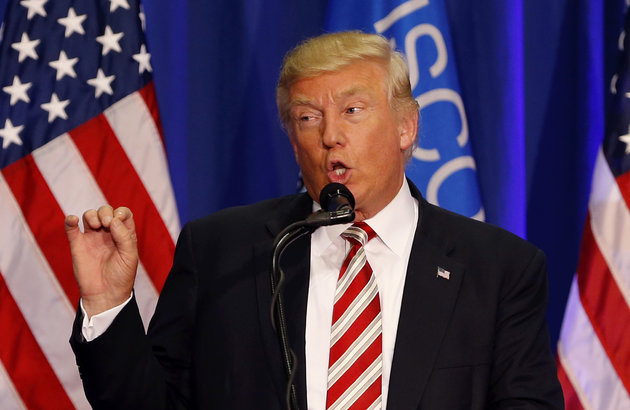
The Rising Tide Of Islamophobia
Khalid Jabara died in an election year marked by perhaps the most nakedly anti-Muslim political speech in the history of the U.S. Trump, the Republican nominee for president, has proposed a ban on Muslims entering the country. He’s called for a national database of Muslims, said that mosques should be surveilled and said that Muslims should be racially profiled. He’s suggested that the Muslim mother of a fallen American soldier didn’t speak at the Democratic National Convention because she wasn’t allowed to talk. He’s also flat-out declared that “Islam hates us.”
Meanwhile, Americans ― many of whom only see news stories about Muslims in the context of terrorism ― have a dim view of Islam. Fifty-six percent think the religion isn’t compatible with American values, and 38 percent don’t have a favorable view of Muslims.
These kinds of attitudes lay the groundwork for anti-Muslim violence. A 2010 academic study from the University of Exeter’s European Muslim research center, for example, found that anti-Muslim media coverage had led directly to a rise in hate crimes against London’s Muslim population.
Earlier this year in Oklahoma, where Khalid Jabara lived, a man called a Bangladeshi store clerk a “terrorist” before stabbing him, and threats were made against Muslims attending an event at the state Capitol.
HuffPost has recorded more than 230 acts of anti-Muslim violence, discrimination and political speech in the United States this year. During the month of Ramadan, there were at least 20 anti-Muslim crimes.
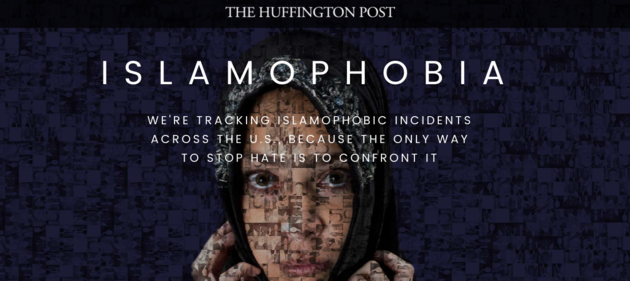
The group Muslims Advocates says it has documented 100 hate crimes against Muslims since the terror attacks in Paris in November. A report released earlier this year by Georgetown’s Bridge Initiative found that there were more acts of anti-Muslim violence and vandalism in 2015 than in any year since the Sept. 11 attacks. And the Council on American-Islamic Relations found 78 instances in 2015 where mosques were targeted for vandalism, arson and other types of destruction ― an increase of nearly 400 percent from the year before.
Of the many anti-Muslim crimes over the past year, at least three were allegedly committed by avowed supporters of Donald Trump.
The Jabaras Did Everything Right
In the last hours of his life, Khalid Jabara called 911 twice. The first time was to say that someone was tapping on the windows of his house. The second time was to say that his next-door neighbor, Majors, had a gun, and that he’d even fired it inside his home.
According to the Tulsa World, police responded 90 minutes after the first call and 50 minutes after the second. When they came to Majors’ house and he didn’t answer his door, they left.
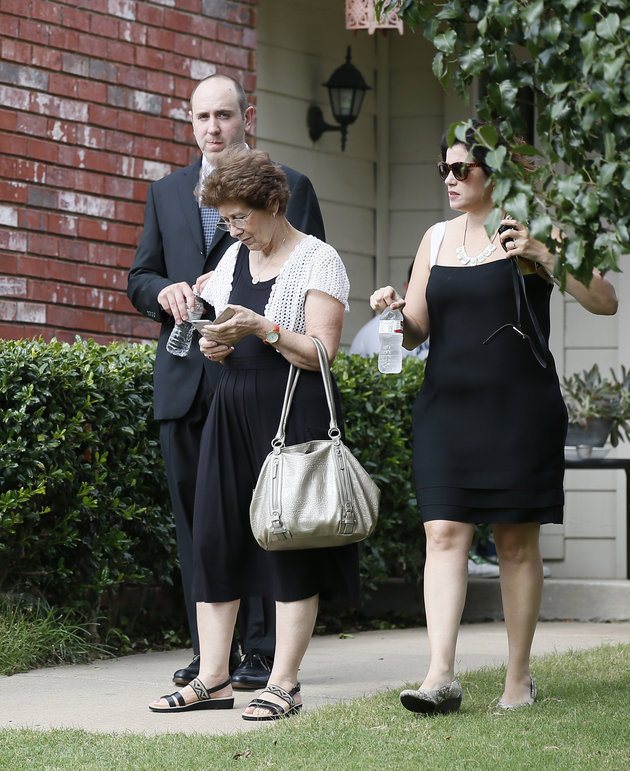
Police explained that when a 911 dispatcher asked Khalid if he wanted to give a statement to the officers, Khalid said no ― likely because he didn’t want Majors to know he’d called the cops. Without Khalid as a witness, police explained, they couldn’t legally enter Majors’ home. So they left.
Eight minutes later, Khalid was gunned down.
“The Constitution allows for people to bond out,” Tulsa police Sgt. Dave Walker told The Washington Post, explaining why Majors was out of jail in the first place. “That said, certainly, knowing what we know today, decisions would be made differently.”
Police likely didn’t know, for example, that the Jabaras had a protective order against Majors.
“[The Jabaras] did everything that they could to keep themselves safe, and it wasn’t enough,” Rebecca Abou-Chedid, a family friend and spokesperson, told HuffPost. The family, she said, fortified their doors and bought a security camera. She pointed out that Khalid’s older brother, Rami, is a lawyer and was “comfortable with asserting family’s rights,” constantly putting pressure on the local district attorney’s office to review Majors’ release from jail on bond.
Majors “should not have been released without monitoring,” Victoria, Khalid’s sister, wrote in a Facebook post. “Yet he was released and put back next door to us, the family he assaulted just months before. This is troubling at any time, but profoundly disturbing given the current climate of our country and the increase nationally in cases of hate crimes.”
“While one cannot explain irrationality and evil, one thing I can explain is that indifference and inaction were major factors leading to Khalid’s death,” Rami wrote on Facebook. “As an attorney, I have seen the system fail defendants, but it also seems to fail the victims just as much or perhaps more. I feel like my family lost, my community lost. My brother lost. We all lost. I feel like we did everything we possibly could do [to] advocate for and protect ourselves.”
“We did everything we could to be advocating for our own victim family and we were diligent,” he continued. “What happens to the average victim?”
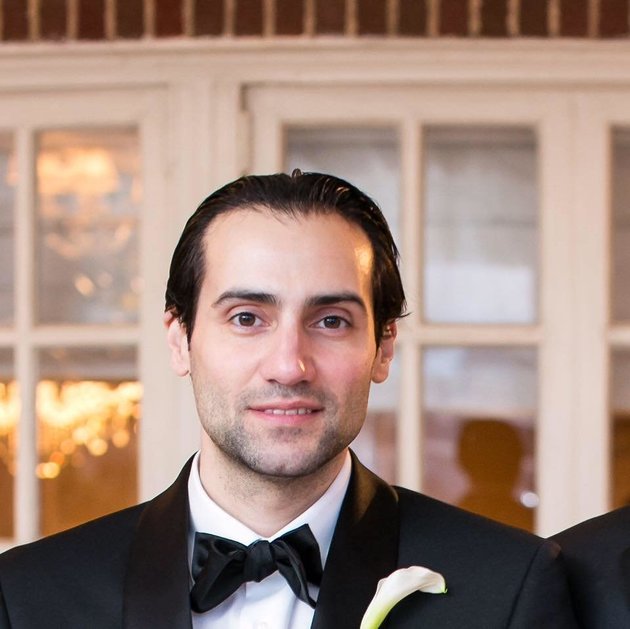
Abou-Chedid told HuffPost that Khalid’s death needs to serve as a wake-up call for law enforcement.
“Police around the country need to understand that crimes based on ethnicity need to be taken seriously,” she said.
In a separate interview with The Washington Post, Abou-Chedid directly attributed Khalid’s death to the anti-Muslim political climate in America.
“After 9/11 you did not see the rhetoric that you see now. It’s gotten so much worse,” she said. “If crazy people keep hearing that Mexicans are rapists and Arabs are terrorists, well … who are crazy people going to take their craziness out on?”
CORRECTION: A previous version of this article stated that Majors was merely arrested in connection with the 2015 hit-and-run. In fact, he confessed to the crime. This article also misstated the order of events around the hit-and-run; Majors made his remarks about Arabs killing gay people after he struck Haifa Jabara with his car, not before.

